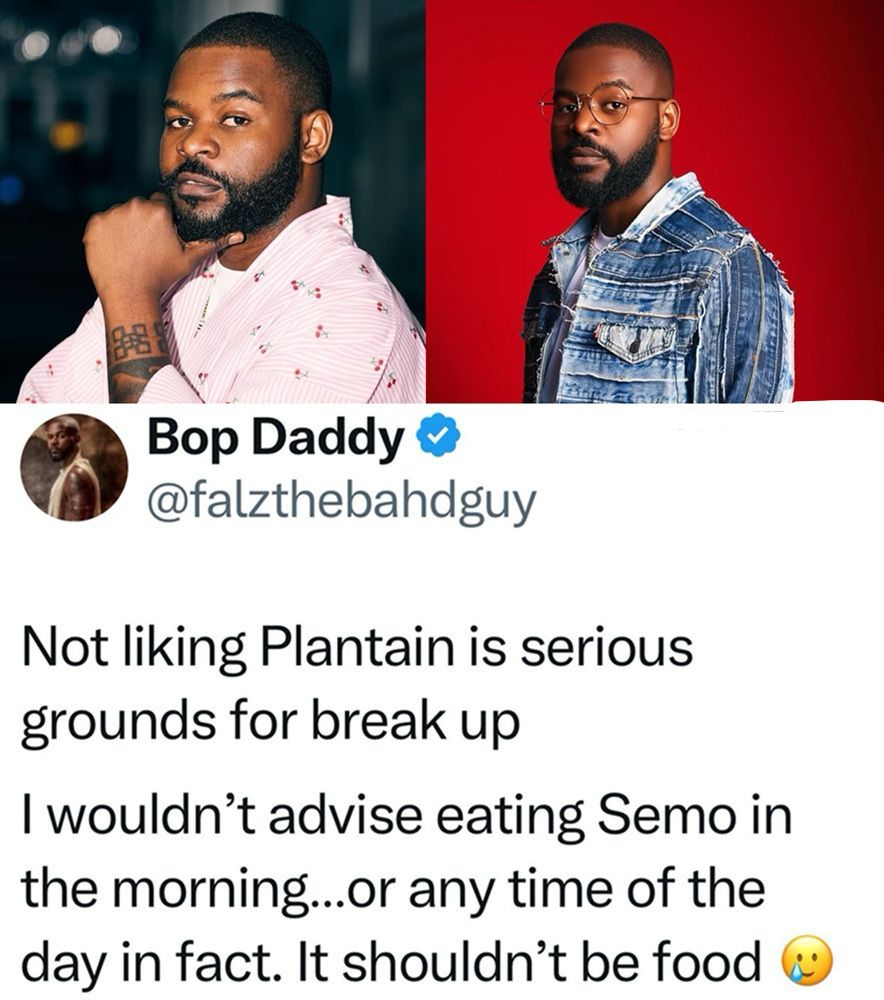
Falz Declares Love for Plantain Non-Negotiable, Says Disliking It Is Breakup Material

Nigerian rapper, actor, and all-around entertainer Falz has once again sent the internet into a frenzy, this time with a hilarious but passionate take on one of Nigeria’s most beloved foods—plantain. Known for his witty humor and unfiltered opinions, Falz took to X (formerly Twitter) to express a view that many food lovers could instantly relate to, writing, “Not liking Plantain is serious grounds for breakup.” Within minutes, the post ignited a firestorm of reactions across social media platforms, with fans, foodies, and even fellow celebrities weighing in on what quickly became a trending topic nationwide.
Falz, whose real name is Folarin Falana, didn’t stop there. In the same post, he shared another strong food opinion, stating, “I wouldn't advise eating Semo in the morning...or any time of the day in fact. It shouldn't be food.” The double whammy of controversial food takes proved too delicious for the internet to resist. Thousands of comments poured in, with some fans laughing in agreement, others defending Semo’s honor, and everyone passionately dissecting the sacred place of plantain on Nigerian dining tables.
For many Nigerians, plantain is not just food—it’s an emotion. Fried to golden perfection or roasted as "boli" on street corners, plantain is a beloved sidekick to meals ranging from jollof rice to beans and even white rice. Falz’s playful suggestion that a person’s dislike of plantain could end a relationship struck a chord because it felt like a lighthearted acknowledgment of just how deep that love runs. After all, in a country where food is deeply tied to culture, family, and identity, food preferences can indeed become a surprisingly big deal.
Fans flooded the comments with jokes, memes, and personal stories. Some even shared tales of relationships where disagreements over food, including plantain, led to real fights and breakups. “If you don’t like plantain, how do I even trust your taste in life?” one user wrote. Another joked, “Imagine coming home after a long day and someone tells you they don't like plantain? It's giving betrayal.” The reactions were so overwhelming that Falz’s original tweet quickly amassed thousands of likes and retweets, with many calling it one of the "most relatable tweets of the year."
While the plantain comment generated mostly unified agreement, Falz’s take on Semo, a staple swallow made from semolina, was more divisive. Semo, often served with soups like egusi, ogbono, and okra, has loyal fans who weren't amused by Falz’s outright dismissal. Some users fired back in good humor, defending Semo's honor and insisting that it remains one of the superior swallows. Others agreed wholeheartedly, confessing that Semo’s texture and taste were, in their opinion, less than appetizing. The playful food war raged on for hours, with fans creating polls, hilarious graphics, and videos to campaign for or against Semo.
This lighthearted online drama reminded everyone why Falz remains one of Nigeria’s most beloved celebrities. Whether tackling serious social issues through his music and activism or simply joking about food on the internet, Falz has a unique way of sparking conversations that everyone feels a part of. His authenticity and humor have earned him not just fans but a community that eagerly engages with whatever topic he brings to the table—even if it’s about plantain and Semo.
Beyond the humor, the incident also highlighted just how important food is in Nigerian relationships and social life. In many cultures, food is deeply personal, almost sacred, and sharing meals is a way of building bonds. It’s not uncommon for people to feel a real emotional connection to the foods they grew up eating, and discovering that a partner doesn’t share that love can feel surprisingly jarring. In a country where a well-prepared plate of jollof rice with perfectly fried plantain can win hearts, Falz’s joke about ending a relationship over plantain preferences might not be as far-fetched as it sounds.
Many users jokingly suggested that there should be a "plantain compatibility test" before entering a serious relationship. Others even went as far as creating mock "Plantain Lovers Only" dating groups online. It was all in good fun, but it underscored a real truth: food is emotional, and sharing similar food values can genuinely strengthen relationships.
Falz has always had a knack for tapping into the collective Nigerian consciousness. Whether it’s through his music, acting, or social commentary, he knows how to take everyday experiences and turn them into moments that bring people together. This latest viral moment proved yet again that he understands the pulse of his audience. While some celebrities shy away from posting casual, humorous thoughts for fear of backlash, Falz embraces it, using humor as a bridge to deeper connection.
As the debates about plantain and Semo gradually settled, many fans thanked Falz for giving them a reason to laugh and bond over something as universal and unifying as food. In a world often filled with tension and bad news, a simple joke about plantain was enough to spark joy, remind people of home-cooked meals, and even make them a little more mindful about the small things that matter in relationships.
It’s still unclear whether Falz was entirely joking or if he truly would consider ending a relationship over a partner's dislike of plantain. But one thing is certain: Nigerians’ love for plantain remains unshaken, and now it has a hilarious new champion in Falz. Whether you agree with his takes or not, you can’t deny the man has a point—after all, who wouldn’t want a partner who understands the magic of golden, crispy, sweet fried plantain sitting beside a steaming plate of jollof rice?
As for Semo lovers, the internet might still be split, but they are standing tall, holding onto their plates with pride. In the end, it’s all love, laughter, and a reminder that in Nigeria, food isn’t just about eating—it’s about passion, identity, and sometimes, even love.


